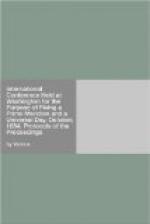The annual sales of nautical almanacs for the past seven years have been:
1877................................18,439 1878................................16,408 1879................................16,290 1880................................14,561 1881................................15,870 1882................................15,071 1883................................15,535
I think, sir, that these are salient points, which will assist the Conference in coming to a clearer view of the great interest which navigation and commerce have in the charts of a particular country.
The question was then put on the adoption of the resolution offered by the Delegate of the United States, Mr. RUTHERFURD, as follows:
“That the Conference proposes to the Governments here represented the adoption of the meridian passing through the transit instrument at the Observatory of Greenwich as the initial meridian for longitude.”
The roll was called, and the different States voted as follows:
In the affirmative—
Austria, Mexico,
Chili, Netherlands,
Costa Rica, Paraguay,
Columbia, Russia,
Germany, Spain,
Great Britain, Sweden,
Guatemala, Switzerland,
Hawaii, Turkey,
Italy, Venezuela,
Japan, United States.
Liberia,
In the negative—
San Domingo.
Abstaining from voting—
Brazil, France.
The result was then announced, as follows:
Ayes, 21; noes, 1; abstaining from voting, 2.
The PRESIDENT then announced that the resolution was passed.
Mr. DE STRUVE, Delegate of Russia. In the name of the Delegates for Russia I have now, at this point of the discussion, to say a few words.
If we had to consider the scientific side alone of the questions, which have already been discussed and resolved by the prominent scientists of the different countries at the General Conference of the International Geodetical Association at Rome, in 1883, we might as well simply adhere to the resolutions of the Roman Conference, and limit our work to the shaping of these resolutions into the form of a draft of an international convention, to be submitted for approbation to our respective Governments. But, as we have, besides, to consider the application of the intended reform to practical life, we beg to submit the following suggestions to the kind attention of the Conference.
It is important to find for the more densely populated countries the simplest mode possible of transition from local to universal time, and vice versa; and we believe, therefore, that it would be convenient for the practical purposes of the question to adopt for the beginning of the universal day the midnight of Greenwich, and not the noon, as was deemed advisable by the Conference of Rome.




